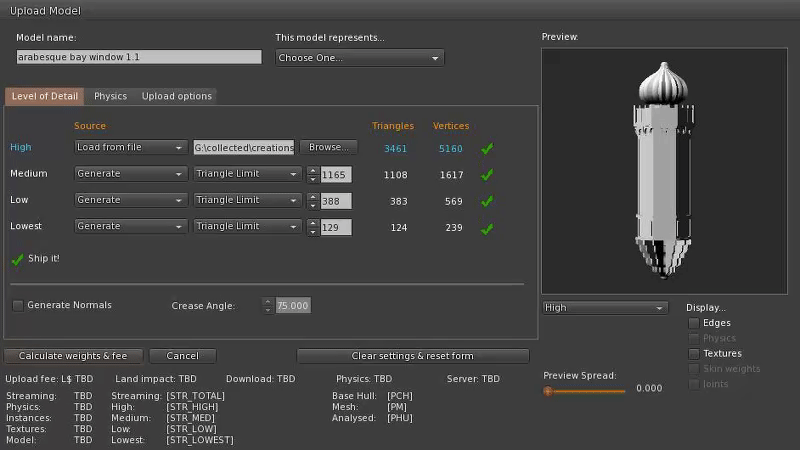With the above thought in mind, I've started to make a few tweaks to the uploader. Nothing major here but I thought I would share a little of the direction I am going in and see what the feedback is.
While I want to address a number of different problems, from the error reporting to the preview window, I've started with some additional information displays. It has been mentioned many times in the forum that the Mesh uploader is a little "random", and whilst there is a grain of truth to that, it is also in large part due to the opaque nature of the numbers we see. In particular, where is the cost derived from and why does the physics shown on the uploader bear no resemblance to that which we see inworld?
Blogger will downgrade this clip but you can peek at the original here
Very rough and ready but what this shows is some extended information that is returned when you "calculate weights & fee". So what goodies do we have here?
There are 3 sets of information I am showing, we will ignore the middle one for now as it is not useful in its present form, so that leaves...
1) The contribution to the fee
As you can see, your upload fee is derived from a number of components:-Streaming
Streaming is a charge derived from the streamable size of the object.Physics
Physics is a fee derived from the physics model, and you can see that it varies with the physics costs that are normally hidden from sight.
Instances
Instances is a little misleading, it is not used in the context of repeats of a mesh, as those familiar with 3D modelling might use the term, it is instead derived from the number of mesh units making up the model. It is effectively the "prim count"Textures
I don't show this in my quick clip above but it is the 10L charge for any textures uploaded with the mesh. Uploading textures with the mesh has always been an option but to my knowledge is rarely used.Model
I have never yet seen this as anything other than the 10L value shown in the clip. I suspect in the workflow it is effectively hardcoded.And so on to the (arguably) more interesting information.
2) The physics costs
Here we find the hidden cost of physics. For years we've moaned about the fact that the Physics cost shown has little relation to that which we get after upload. Most of us will have made the link to the fact that the physics cost shown historically is just the "base hull" cost. That is to say, it is the cost assigned to the shape that is used when "convex hull" is selected. This is the default physics shape post-upload and is a mandatory part of the uploaded asset.But we can also provide a custom physics model, if we choose to provide it as a mesh then a weight based on the number and area of the triangles that comprise that model is computed. While it has not been visible until now, it does influence the price we pay. For reasons we have discussed in this blog many a time in the past, there are occasions where a Mesh physics model is not suitable; in those cases we use the "analyse" function to convert the triangles into a set of hulls, or a "decomposition" in viewer-speak.
While a base hull is mandatory and always present, the mesh and hull based user supplied physics shapes are mutually exclusive, you may only have one. As such pressing analyze and then calculating weights will blank out the Mesh cost and retrieve an Analysed cost.
Will this help you?
OK, so that's it for now. How this will actually appear in a future Firestorm I'm not yet sure. There is a fine line between providing more information and causing more confusion. so while I think it will appear in some form I'll be hoping to discuss it with users and our support team as well.Personally, while seeing the composition of the fee is interesting in passing, it is not essential and anyone tailoring their mesh to minimise the upload cost really needs to consider their motivations. However, knowing exactly what the physics cost will be in-world before you upload is a massive time saver and I believe that this will be popular with my builder friends.
I'd love to hear your thoughts on this. Am I completely off-piste here?

As a Linux user, apparently none of the Physics analysis is available to me, but I have to agree about the sheer obtuse obscurity of the documentation. "Streaming" or "Download"? Same thing, two different names. That sort of extra layer of confusion runs through almost everything. How, I wonder, can the Lindens manage their software when they can't even agree on the names for things.
ReplyDelete